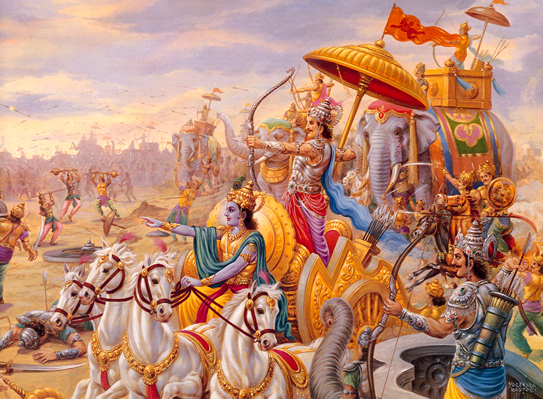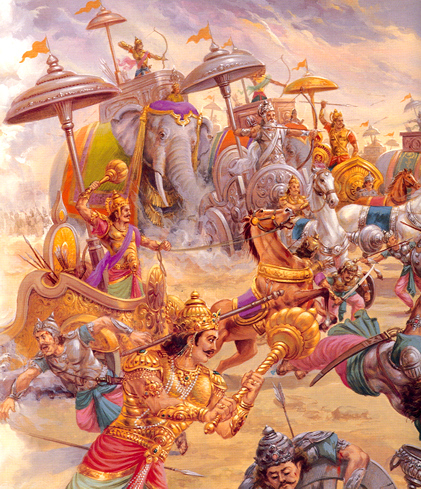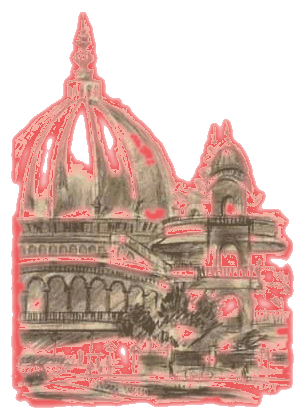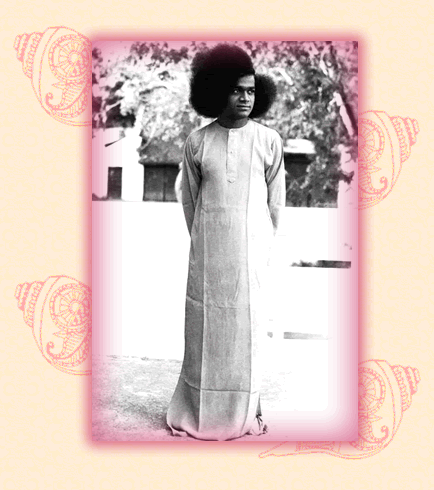|
Other Baba-books
|
||||||||
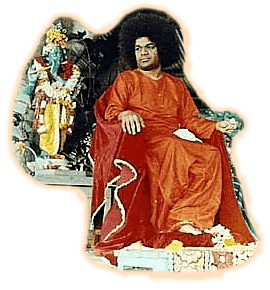 |
The original
Sanskrit verses and with comments taken from the writings of
|
|||||||
|
'O King, over
and over remembering this wonderful message so Holy of Keśava and
Arjuna, 1 2a 2b 3 4 5 6 7 8 9 10 11 12 13 14 15 16 17 18a 18b
"
Listen to this chapter sung! " brāhmana-kshatriya-visām The
four
varnas are universal; they can be found in any
country.The
leaders of thought are the brahmins; the fighters carrying arms
are the kshatriyas; the entrepreneurs and the business
executives are the vaiśyas; the busy producers and laborers
are the śūdras. Whether head or heels, it is the same blood
that circulates through each; it is the same body that claims them as
limbs. Each limb has to perform its task, the task for which it has
specialized. You cannot walk on your head or think with the feet. It is
a cooperative commonwealth, the body as weII as the body politic. The
eye is the master of sight; the ear cannot question the authority of
the eye, nor the eye that of the ear about sound, nor the ear that of
the tongue so far as taste is concerned. Each is the master in its own
field. - Sathya
Sai Speaks IV, p. 159 śamo damas
tapah śaucam Those
endowed
with
the
satva guna, who have understood the Brahma-tatvam,
who
foster
spiritual, moral and progressive living, who help others to
earn the bliss of visualizing the reality of their own nature, are the brahmins.
-
Gītā Vahini, p. 65 śauryam
tejo dhritir dākshyam Those
who
stand
by
and guard the sound political system, law and justice, as
weII as the welfare and prosperity of the country, and the moral order
laid down for the people; and who keep under control the wicked and the
immoral and come to the rescue of the weak and the distressed - these
are the kshatriyas. - Gītā Vahini, p. 65 krishi-go-rakshya-vānijyam Those
who
store
and
supply within proper limits to the people at large the
wherewithal for happy physical living are vaiśyas. Those who
lay the foundation for human welfare by service activities and provide
the strength and sinews are śūdras. - Gītā Vahini, p. 65 sve sve
karmany abhiratah Karma
or activity is primarily movement, motion. Movement results in energy
and matter is but condensed energy ... Life is karma; the body
is karma-kshetra. All living things are engaged in karma
offering themselves in sacrificial rite of ceaseless activity. The
fruit of that sacrifice is self-realization. - - Sathya Sai Speaks VIII, p.
183 yatah
pravrittir bhūtānām The
secret
of
good
karma is to do karma as an act of
worship, a dedicatory rite offered to the source of all energy and
intelligence. And never take the consequence to heart. By this means,
one can approximate to the divine principle, which is beyond activity. - Sathya Sai Speaks VIII, p.
14 śreyān
sva-dharmo vigunah Then
Krishna emphasizes the importance of sva-dharma. Sva-dharma
is individual dharma or a code of conduct in conformity with an
individual's status in society. It also is determined by a person's
natural instincts. -
Summer
Showers
in
Brindavan 1979, p. 26 saha-jam
karma kaunteya It
is only in the karma that is your very nature that you can have
fortitude; if it is an assumed duty, you will find it difficult to put
up with the troubles and travails. Assumed karma is called saha-jam
karma. Karma that is the expression of one's genuine self
is saha-jam karma. Now saha-jam karma will sit light
and a-saha-jam karma will always be a burden. A-saha-jam
will induce conceit, or the feeling "I am the doer"; so it will result
in exhaustion or elation, disgust or pride. - Gītā Vahini, p. 49 asakta-buddhih
sarvatra One
meaning
of
karma that is popularly accepted is that it is one's
destiny or fate, the inescapable "writing" on the brow, which has to
work itself out. There is no escaping it. But people forget that it is
not written by some other hand. It is all written by one's own hand.
And the hand that wrote it can also wipe it off. The husk with which
the paddy is born can be removed by effort; the māyā that
persuaded you to write all that destiny can be conquered in an instant
and then, the entire page can be wiped off. - Sathya Sai Speaks VIII, p. 86 siddhim
prāpto yathā brahma If
one
knows
the
aspects of ātmā one can enjoy bliss. If one does
not know the same, will suffer; knowledge of Brahman leads one
to merge into Brahman. This word of Sai is a statement
of truth. - Summer Showers in
Brindavan 1978, p. 98 buddhyā
viśuddhayā yukto vivikta-sevī
laghv-āśī ahankāram
balam
darpam brahma-bhūtah
prasannātmā Simply
because
you
have
the form of the human body, you should not think that
you are truly human in nature. Only the external form tells you that
you are human. The inner aspect is the aspect of Brahman. Brahman
is one who has no specific form or qualities, and such Brahman
is present in the depths of your heart. While He is present in your
heart, it is not right for you to put up several pretences and false
appearances. The body is the temple and the Jīva is the ancient
deity residing in that temple. Therefore, the aspect of Brahman
that is permanent and is symbolic of truth is resident in your heart
and if, under these circumstances, you begin to exhibit desires and
show distortions, it will be doing injustice to this permanent resident
in your heart. Therefore, you should make an effort to enter this
aspect of Brahman even if it be to a small extent and thereby
help others, take to good actions and a good path and enjoy the fruits
of such good deeds.
-
Summer Showers in Brindavan 1974, p. 41 bhaktyā mām
abhijānāti As
the
oil
is
to the flame in the lamp, bhakti (devotion) is to
the flame of j˝āna (knowledge). The heavenly tree of the joy
of j˝āna thrives on the refreshing waters of bhakti.
Understand this well. It
is for this reason that Krishna, who is the personification of prema
and who is saturated with the quality of mercy, declared in the Gītā: "bhaktyā
mām
abhijānāti" (I am known by means of bhakti). - Jnana
Vahini, p. 18 sarva-karmāny
api
sadā The
sankhyans use a number of arguments against action
or karma. Karma causes both punya and papa,
goed
and
evil,
and so it is said, "the wise must give up all karma".
In the Gītā, Krishna has met this argument and shown
the way to get the good out of karma and avoid the evil. They
further say that if karma is engaged in, the results are a
mixture of pain and pleasure, benefit and loss, and it leads the doer
either to heaven or hell or back again to the earth, that is to say, to
bondage of some sort. So, they ask people to give up karma and
take to inaction. The Gītā has a reply for this also. Karma
will bring about bondage, only when it is engaged in with a view to the
fruit thereof. When done without any thought of the fruit, it leads on
the other hand, to liberation, or moksha itself! - Prasanthi
Vahini,
p.
48 cetasā
sarva-karmāni When
the
desire
to
attain the fruit of action is renounced with full
intellectual awareness, then comes what Krishna calls buddhi-yogam.
The
intellect
has
to be purified and trained; otherwise, it is
impossible to give up attachment to the fruits of action and to
continue doing things, as either duty or dedication. Such a purified
intellect is named yoga-buddhi. Cultivate it and then, through
it, liberate yourself from the bondage of karma. Really
speaking, you, the true you, are above and beyond karma. - Gītā Vahini, p. 33 mac-cittah
sarva-durgāni A
sense of joy is necessary for dhyānam (exercising meditation on
the Supreme Lord, who resides in the heart as the Supersoul) and dhāranā
(concentration, retention, understanding, firmness, holding, bearing,
collecting, supporting) to progress, but many things deprive you of the
atmosphere of joy. So you must pray sincerely, in order to be free from
such obstacles. The recital or repetition of mantras will be of
great help. Krishna in the Dvāpara Yuga said, "mac-cittah
sarva-durgāni mat-prasādāt tarishyasi", which means, "When you
start fixing your thoughts on Me, all thoughts that agitate you will be
stilled through My Grace". - Dhyana
Vahini, p. 42 yad
ahankāram āśritya Ahankāram
or egoism is the māyā. - Sathya Sai Speaks II, p. 95 svabhāva-jena
kaunteya Karma
(activity and deeds resulting therefrom) are binding because they have
consequences that must be suffered or enjoyed. - Bhagavatha Vahini, chapter
32. īśvarah
sarva-bhūtānām You
must
realize
by constant contemplation that the world is the body of
God. And, you are a cell in that body. The prosperity of the world is
your prosperity; feel so, act in that spirit; think in those terms.
That is real spirituality. The sadhak cannot cut himself away
from the world and escape into solitude, for the world will follow him
into the deepest cave or the darkest forest. The sadhak can
claim progress only when he has established in himself faith in the
oneness of humanity. "īśvarah sarva-bhūtānām hrid-deśe 'rjuna
tishthhati", says the Gītā. O Arjuna, the Lord is seated in
the hearts of all beings. - Sathya Sai Speaks VIII, p. 167 Bharat
has contributed to the world the priceless gem of
truth: "īśvarah sarva-bhūtānām hrid-deśe 'rjuna tishthhati",
God is the resident motivator of all beings. Until this fact is
realized by the individual, he will be tainted by traces of anger,
pride and hate, for he sees others as distinct and different. -Sathya Sai Speaks VI, p.
243 tam eva
śaranam gaccha Saranagathi
or unconditional surrender is the main gate to enter the mansion of mukti
(moksha). - Sathya Sai Speaks III, p. 99 Saranagathi,
leaving
everything
to His Will, is the highest form of bhakti. - Sathya Sai Speaks I, p. 15 The Lord
may have two or two hundred vows; that is His Will. But, the bhakta
need have only one vow, to save himself - the vow of total surrender,
of saranagathi. If you have full faith in the divinity of every
being, the attitude of surrender will be automatically fixed in you. Do
not treat them as nara (human); treat them as Nārāyana,
the Lord Himself. iti te
j˝ānam ākhyātam sarva-guhyatamam bhūyah man-manā
bhava mad-bhakto "Fix
thy
thought
on
Me; be devoted to Me; worship Me; do homage to Me; thou
shalt reach Me. The Truth do I declare to thee; for thou art dear to
Me. This is My teaching, My grace." - Gītā Vahini, p. 7 When
Arjuna
plaintively
approached Krishna for courage and consolation, the
Lord advised him, "man-manā bhava". Fill your mind with Me. Let
all urges be for Me; let all acts be dedicated to Me. - Sathya Sai Speaks VI, p.
122 Krishna
in the Gītā declared against the worship of low forces. He said
those who adore the devas attain the devas; those who
adore the Manes (pitrin: ancestors/forefathers) attain
the Manes; those who adore the low forces attain them; but,
those who adore Me, attain Me (B.G. 9:25). He said, man-manā bhava
mad-bhakto mad-yājī mām namaskuru (B.G. 9:34). Fill your mind with Me, be
devoted to Me, renounce for My sake, surrender to Me. - Sathya Sai Speaks VII, p.
306 Manmāna
- that is, seeing Him in every being, being aware of Him every moment
of existence, being immersed in the ānanda of this awareness; Mad-bhakto
- that is, merged in the relationship caused by the profound devotion
and love to Him; Mad-yājī - all acts, big and small, dedicated
to Him, Krishna (wish, will, attitude, activity, fruit, consequence)
everything from beginning to end, the renunciation of all attachment to
the self and the performance of all acts in a spirit of worshipful
non-attachment. This is what the Lord seeks from you. - Gītā Vahini, pp. 7-8 "mām
evaishyasi
satyam
te" (you will come near Me, you will be
approaching Me); that is to say, you will understand My mystery, you
will enter into Me, you will achieve My nature. In these terms, sādrisya
(acquiring divine nature) sālokya (existence in God) sayujya
(unity in God), are indicated. When one has attained the state of
realizing the divinity in every being, when every instrument of
knowledge brings the experience of that divinity, when It alone is
seen, heard, tasted, smelt and touched, man becomes undoubtedly a part
of the body of God and lives in Him and with Him. When this duty to
your own progress is taken up you will get a new strength at the very
first step; you will thrill to a new and purer joy, you will taste the
fullness of bliss, you will be refreshed by a new holiness. This dharma is not laid down or
recommended for the
extraordinary among men. It is within the reach of all, for all have
the hunger for God, all have the discrimination to discover that there
is something basic behind all this change. Even the most heinous sinner
can quickly cleanse his heart and become pure by surrendering to the
Lord in anguished repentance. Therefore,
the
Lord's
command is that each should pursue the special dharma
laid down for him; each person should plan his life according to the
spiritual foundations of his culture; he should give up the "objective
vision" and listen to the voice of God. - Gītā Vahini, pp. 8-9 sarva-dharmān
parityajya "This
is
the
path
to come to Me. Give up all dharmas; surrender to
Me; do not grieve; I shall liberate you from the consequences of all
your acts." ... Is not this act of surrender enough to save you and to
liberate you from the round of coming to - staying in - and leaving
from this world?
- Gītā Vahini, p. 7 Krishna
says in the Gītā that He will release you from bondage, the
moment you renounce sarva-dharman, all feelings of obligation
and responsibilities, of rights and duties, of "from me" and "to me";
that is to say, He requires the renunciation of the identity of the
individual with the body. That
is the dharma, the supreme duty, which Krishna had come
to teach. Man has a duty to himself - recognizing that he is divine,
and nothing else. When he neglects this, and strays into the bypaths,
God incarnates and brings him on the right path again. - Sathya Sai Speaks VII, pp.
149-50 The Mahābhārata
War is not a chapter in ancient history,
it is taking place in every human breast, between the forces of good
and evil. He who recognizes the value of installing the Lord, the Yogeśvara,
Krishna as the charioteer is certain to win; others fail to foil
the forces of evil; they succumb and fail. Accept Him as your Master;
surrender all activities to Him; dedicate your words and deeds and
thoughts to Him, as flowers at His feet; He assures you "mokshayishyāmi"
-
"I
shall
liberate you"; He assuages you, "mā śucah" - "do not
grieve". -
Sathya Sai Speaks V, p. 37 Surrender
your
jewels
of
intelligence, cleverness, capacity to serve and the gem
that you most value, namely, your EGO to the care of God; then, you can
be happy. "Maam edkam saranam vraja", he invites; surrender to Me
alone. Then He assures, "Maa sucha", you need not grieve at all. - Sathya Sai Speaks V, p. 214 idam te
nātapaskāya The
Lord
has
shown in the Gītā that you could preach only after
recognizing the merit or qualification and worthiness of the recipient.
It is explicit that there is no point in teaching such a good thing to
one who has no belief. You must see whether he has faith and belief or
not. You must also see that the recipient has fear of sin and reverence
for God. Unless he has these qualities, the recipient has no right to
receive the good and great teaching - that is contained in the Bhagavad
Gītā. Not only that, your teaching may become irrelevant if you go
and teach one who has not these qualities. - Summer Showers in Brindavan 1972, p. 105 ya idam
paramam guhyam na ca
tasmān manushyeshu adhyeshyate
ca ya imam Liberation
from
the
consequence
of ignorance can be secured only by knowledge, or j˝āna.
The Upanishads themselves declare "j˝ānād eve thu
kaivalyam"
by knowledge alone can freedom be won. - Upanishad
Vahini,
I. śraddhāvān
anasūyaś ca Spiritual
knowledge
can
be
acquired by every individual, "Where there is a will,
there is a way." The first step on the path of spirituality is the
acquisition of anasūyas or freedom from envy, jealousy, malice
and covetousness. Asūya or jealousy should be completely rooted
out of the human heart and śraddhā-vān or perseverance should
be cultivated instead. The ātmā should be visualized through
meditation. The sincere and persistent sādhaka will then
certainly have spiritual experiences and mystical revelations. - Summer Showers in
Brindavan 1979, p. 142 kaccid etac
chrutam pārtha To
get
the
fruit of gītā-parayana, ekagratha is essential.
Krishna asks Arjuna, "Has this been heard by you with an attentive
mind? Have you heard it without distraction?" For the battle-field
where they were, had plenty of distractions to disturb the
concentration of Arjuna's mind from the invaluable lessons he was
receiving from Krishna. It is really admirable that Arjuna, seated in
the chariot between the two armies, manages to master his mind and rid
it of all the passions with which it was filled when he rode in for the
fray! Truly, he is an ideal disciple. You should thank him for
eliciting the Bhagavad Gītā for all humanity. - Sathya Sai Speaks II, p. 53 arjuna uvāca After
listening
to
the
Gītā and seeing the manifestation of the Lord
as the entire universe, Arjuna confessed that he has lost the delusion;
"nashtho mohah". The disappearance of delusion is the liberation
all crave for. Moksha is the kshaya (disappearance) of
moha (delusion). - Sathya Sai Speaks VII, p. 308 sa˝jaya
uvāca vyāsa-prasādāc
chrutavān Yogeśvarāt
is one whose deeds are unselfish, who works for the welfare of the
world, and who embodies the spirit of sacrifice. The attributes of
purity, permanence and bliss are applicable to divinity. So, God has
been described as having eight qualities. He is absolute, immaculate,
ancient, eternal, spotless, wise, unfettered and untainted. The devotee
who takes shelter at the feet of such divinity shall be ever victorious. - Summer Showers in Brindavan 1979, p. 21 rājan
samsmritya samsmritya tac ca
samsmritya samsmritya "Sa˝"
means
good,
"jaya" means to gain victory. So the name of Sa˝jaya
denotes that he has gained a good and righteous victory. Of pure and
pious disposition, Sa˝jaya had contributed to the well-being of
the world through holy and disinterested actions. - Summer Showers in
Brindavan 1979, p. 20 In
order
to
fulfill the yearning of the bhakta, Hari, the
immanent Basic Being of the Universe, will come, in any Form, in any
Thing, at any Place.
- Dhyana
Vahini, p. 28 yatra yogeśvarah
krishno When
the
blind
king Dhritarāshthra asked, "O Sa˝jaya! Can
you tell me how my sons are doing on the battlefield and in what state
they will return home?", the wise. Sa˝jaya unhesitatingly replied,
"Where the Yogīśvara works in conjunction with Pārtha
wielding the Gāndīva, there will lie victory, prosperity, glory
and felicity." -
Summer
Showers
in
Brindavan 1979, p. 20 The Gītā
is the very voice of Lord Krishna. The
fact that it has provided consolation and liberation to millions of men
is evidence of its Divine Origin. A lesser person could not have given
it that authenticity. The
way it begins and the way it ends gives the clue to the subject it
expounds. The very first verse starts with the words, "dharma-kshetre
kuru-kshetre ...", the word dharma being the leading word.
The last verse of the final Eighteenth Chapter speaks of "yatra
yogeśvarah krishno" and this word, "yogeśvarah" sums up
the dharma that is taught. Thus, it is clear that the objective
of the teaching in the Gītā is just this: "Remember dharma;
practice
dharma". How significant is this word! All śāstras
are engaged in demarcating and defining the nature and subtle
characteristics of dharma. The Gītā incorporates this
study and this analysis. It is a textbook of dharma, in all its
aspects. It discusses all the principles underlying dharma. - Gītā Vahini, pp. 2-3 The
last sloka of the Gītā says ..., "Where there is Krishna
the supreme Yogī, and where there is also Arjuna bearing his bow, there
victory for truth and justice is assured." This verse assures victory
not only when the Mahābhārata Arjuna wields the bow in the
presence of Krishna. Everyone of you can be Arjuna and wield
the bow and achieve victory. For the bow is just the symbol of courage
and faith, of high resolve and undaunted calibre. And how can you
become Arjuna? Arjuna means white, pure, unsullied, without blemish. As
soon as you become that and hold the bow (the Upanishads
declare that the pranava or Om is the arrow and God is
the target), Krishna is ready with His presence, for He is every-where
at every moment. There is no reason to invite Him or install Him. He
will answer from your very heart. - Sathya Sai Speaks VIII, pp. 110-11 Thus ends the Bhagavad Gītā
- The Divine Song, as taken down by Śrīla Vyāsadeva in the
Mahābhārata; Bhīshma Parva, chapter 23-40, the original Sanskrit
verses, word for word translated and with comments taken from the
writings of With
gratitude and thankfulness to 'The Bhagavad Gītā of Order', *The two paintings of Lord
Krishna and Arjuna in
battle are by: Sriman Yogendra Rastogi, India
|
||||||||




